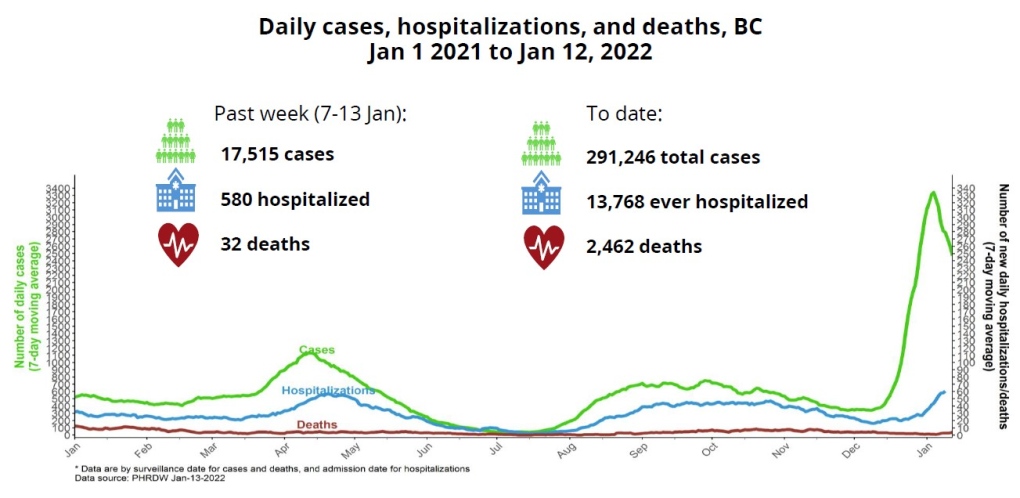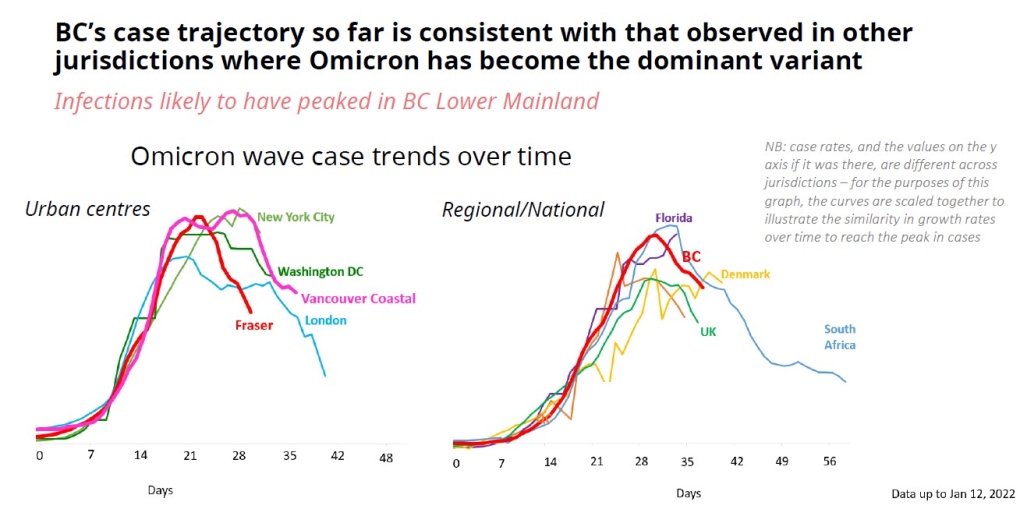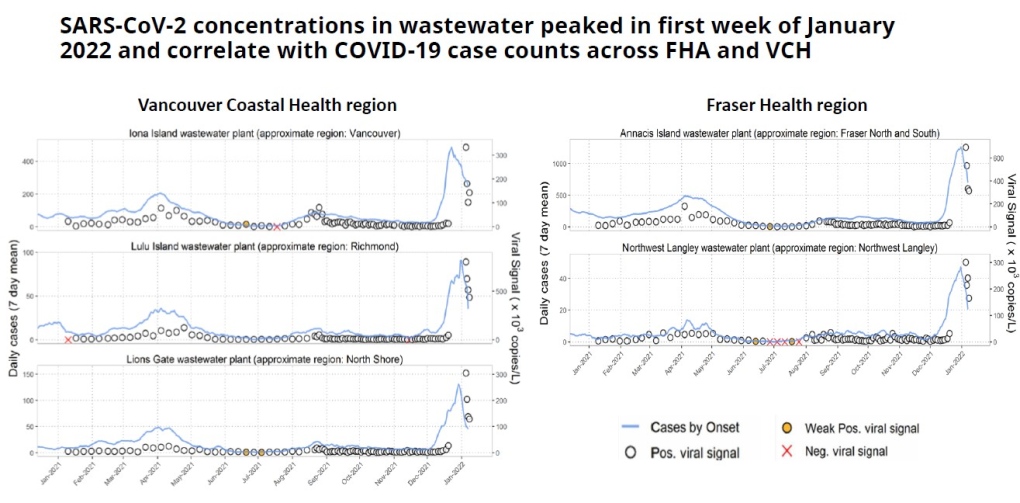B.C. likely hit COVID-19 transmission peak last weekend, officials say, revealing latest data
The latest COVID-19 wave may be on a downward trajectory in B.C., health officials announced Friday.
Dr. Bonnie Henry and Health Minister Adrian Dix shared the latest modelling data in a morning news conference, revealing they believe the local peak of infections was likely hit last weekend. Daily cases reached record-breaking levels recently, largely due to how transmissible the Omicron variant is.
COVID-19 case data in the latest wave hasn't painted a full picture of how many people are infected with the disease as B.C. has struggled with its testing capacity. The more reliable PCR tests are being reserved for people who are more at risk for developing serious illness, unvaccinated or doing front-line work. Rapid tests, however, are still difficult for most people to access.
As a result, officials said Friday that PCR testing – and therefore reported case counts – just represents a subset of the community, but that it's a high-risk subset with high test-positivity rates. Officials said those positive PCR results are declining, adding that the specific case numbers aren't as important as the overall trajectory.
Officials suggested that transmission is still likely three to four times the numbers reported daily.
"We've been at the capacity of our PCR tests for a number of weeks now," Henry said.
"But it does give us a sense because we've been monitoring PCR testing over time, it does reflect the change and the patterns over time." Modelling data released by B.C. health officials on Jan. 14, 2022.
Modelling data released by B.C. health officials on Jan. 14, 2022.
Additional data shared by health officials showed the Lower Mainland's case trajectory is similar to other urban centres where Omicron has become dominant, with the latest wave lasting just a few weeks before starting that downward trend.
"We can now say with some confidence that the pattern shows a sustained decrease and that pattern reflects what we're seeing in other jurisdictions," Henry said.
That B.C. may have reached its peak in this wave so quickly isn't a huge surprise, officials said, explaining the Omicron variant has shown to have both a shorter incubation period and a shorter illness duration.
 Modelling data released by B.C. health officials on Jan. 14, 2022. Another way health officials have tracked the trend in local cases is through wastewater testing. Screening of wastewater at five Metro Vancouver plants shows detection of the virus is trending downward.
Modelling data released by B.C. health officials on Jan. 14, 2022. Another way health officials have tracked the trend in local cases is through wastewater testing. Screening of wastewater at five Metro Vancouver plants shows detection of the virus is trending downward.
Throughout the pandemic, wastewater has been used as an early warning signal for COVID-19 in a community and fill the gaps when testing is over capacity.
"When we look at wastewater surveillance, it's not dependent on who gets tested," Henry explained. "It really is a barometer of how much virus is in a community."
Henry said that surveillance suggests a peak in the virus at around the first week of January, which she said "is very similar" to PCR testing data.
 Modelling data released by B.C. health officials on Jan. 14, 2022. But even with cases declining, the same can't be said for hospitalizations.
Modelling data released by B.C. health officials on Jan. 14, 2022. But even with cases declining, the same can't be said for hospitalizations.
"We are still at the point where our hospitalization rate is going up," Henry said. "New hospitalizations (are) still a concern."
Officials explained those rates tend to be delayed compared to infections and that it could be about a week or two before there's a decrease in those numbers.
CTVNews.ca Top Stories

Canadian gov't proposes new foreign influence registry as part of wide-spanning new bill
Prime Minister Justin Trudeau's government is proposing a suite of new measures and law changes aimed at countering foreign interference in Canada, amid extensive scrutiny over past meddling attempts and an ever-evolving threat landscape.
Boeing Starliner capsule's first crewed test flight postponed
The long-awaited first crewed test flight of Boeing's new Starliner space capsule was called off for at least 24 hours over a technical issue that launch teams were unable to resolve in time for the planned Monday night lift-off.
Teacher charged in historical sexual assault of Calgary teenage girl
Calgary police have charged a teacher with the alleged sexual assault of a teenage girl more than 20 years ago.
Winnipeg man admits to killing four women, argues he's not criminally responsible
Defence lawyers of Jeremy Skibicki have admitted in court the accused killed four Indigenous women, but argues he is not criminally responsible for the deaths by way of mental disorder – this latest development has triggered a judge-alone trial rather than a jury trial.
Man banned from owning animals after fatal Calgary dog attack
The owner of three Calgary dogs that got loose and mauled a woman to death in 2022 has been ordered to pay a $15,000 fine within one year and banned from owning any animal for 15 years.
East-end Ottawa family dealing with massive rat infestation
Residents in Ottawa’s Elmridge Gardens complex are dealing with a rat infestation that just won’t go away. Now, after doing everything they can to try to fix the issue, they are pleading with the city to step in and help.
Mediterranean staple may lower your risk of death from dementia, study finds
A daily spoonful of olive oil could lower your risk of dying from dementia, according to a new study by Harvard scientists.
An El Nino-less summer is coming. Here's what that could mean for Canada
As Canadians brace themselves for summer temperatures, forecasters say a weakening El Nino cycle doesn’t mean relief from the heat.
Newfoundland and Labrador latest province to tighten rules on Airbnbs
Newfoundland and Labrador is the latest jurisdiction to bring in stricter rules for short-term rentals, with a coming set of regulations that will force operators to register with the provincial government.

































